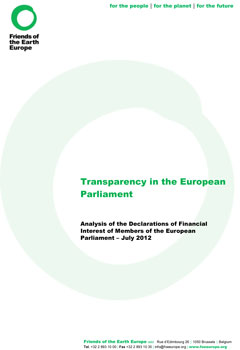
In March 2011, Members of the European Parliament (MEPs) were caught red-handed accepting money for tabling amendments to legislation. What was soon to be referred to as the ‘cash for amendments’ or ‘cash for law’ scandal caused an outcry in Brussels circles.
In response, Jerzy Buzek, then President of the European Parliament, started a process to set up an ethics code for the institution, which had, until then, been missing. The ‘Code of conduct for Members of the European Parliament with respect to financial interests and conflicts of interest’ was agreed at the end of 2011 and entered into force on January 1st 2012.
This research reveals some of the weaknesses of the new declaration system, six months after it entered into force: the questionable accuracy of the data provided by some MEPs, and the failure of some MEPs to treat the declaration seriously.







